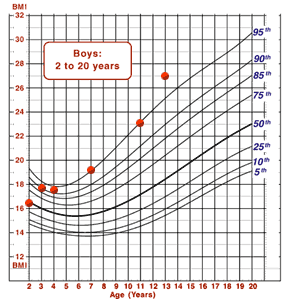 |
 |
 |
 |
Your weight has been important since the moment you were born. Maybe you even know what your birth weight was. Most babies weigh less than 10 pounds and sometimes as little as 3 or 4 pounds. But very quickly, a young baby gains weight and everyone is glad about that because it means the child is growing bigger and stronger.
As you get older, your weight is still important. It's something your parents and doctor will probably keep an eye on. When you go to the doctor, he or she often will record your height and weight and compare it to what it was the last time you came in. The doctor wants to check that you are a healthy weight because weighing too much - or too little - can be a problem. But these days, being overweight is more common than being underweight.
In the last 30 years, a growing number of kids and teenagers have developed weight problems. Today, 9 million kids ages 6 to 19 are overweight. Many grown-ups understand what it's like to have weight problems. More than half of adults are overweight or obese, which is a word that means very overweight.
For kids and adults, weighing too much can lead to illnesses and health problems. And a kid who is overweight might get teased or find it hard to keep up with friends on the playground.
What Does It Mean to Be
Overweight?
When people talk about being overweight they mean that someone
has more body fat than is healthy. Everyone has some body fat,
but when someone has excess fat, it can affect the person's health
and ability to walk, run, and get around. It also affects the
way they look and may cause them to be bigger and rounder than
other people.
How Is It Measured?
Someone can be overweight, underweight, or at an ideal weight.
There is no one perfect weight for a kid to be, but there are
ideal weight ranges for kids based on height and whether the person
is a girl or a boy. Though healthy kids can weigh more or less,
a good weight range is about 50 to 70 pounds (about 23 to 32 kilograms)
for a kid who's 8 years old.
But being overweight is more than a number on the scale. A doctor is a good person to make a judgment about a kid's weight. The doctor can look at a kid's ideal weight range while also taking the kid's height into account. A taller kid naturally could weigh more than a shorter kid and not be overweight. Perhaps the best way to determine if a kid is overweight is to use something called body mass index, or BMI.
BMI uses a kid's height and weight in a calculation that results in a number. That number can be plotted on a chart that also considers the kid's age and if the kid is a girl or boy. BMI is an indicator of how much body fat the person has, but it's only an estimate. Because muscle weighs more than fat, it's possible for a muscular person to have a high BMI, but that doesn't mean he or she is overweight. Likewise, it's possible for someone to have a low or ideal BMI but still have too much body fat.
Why Do People Become Overweight?
Most of the time, people become overweight because the body gets
more calories (from foods and drinks) than it burns through physical
activity, such as playing soccer or walking to school. Extra calories
are stored as fat. The more extra calories a person consumes,
the more fat is stored.
This happens very easily in modern life. People spend more time
in front of TVs or computers and less time exercising. We drive
everywhere instead of walking or riding bikes. Fewer schools offer
gym classes; more kids play video games than active ones like
dodgeball. Even grown-ups spend more time sitting at desks and
in cars than they once did. People also lead busier lives so they
have less time to cook healthy meals. We eat more restaurant meals
and ready-made food from a box.
Being overweight also can run in families, but don't let that discourage you from making changes that could help you reach a healthy weight. Your habits - what kind of food you eat and how much you exercise - can make a big difference. The biggest problem for most people is not getting enough activity and exercise.
What Can Being Overweight
Do to Your Health?
It's hard to feel good when your body has too much weight to carry.
Being overweight can make it harder to breathe and sleep. It can
make a person feel tired and cause aches or pains. Being overweight
also can make you embarrassed, sad, or even angry. And when people
feel bad, they may eat more because food can be comforting. This
isn't a good idea, especially if the person is already overweight.
Getting help is important because being overweight can make you sick. Overweight kids have a greater chance of getting diabetes. And later in life, an overweight person has a higher risk of getting heart disease.
How Can You Keep From Becoming
Overweight?
The best way to stay at a healthy weight is to be active. You
can join a sports team. Or, if you don't like team sports, try
swimming, tennis, martial arts, or just being active in your own
backyard. Jumping rope, dancing, and walking will get your heart
pumping. Getting some extra exercise can be as easy as taking
the stairs instead of the elevator or walking instead of having
your parents drive you. Being active also means watching less
TV and playing fewer video games.
Eating healthy is another part of staying fit. Aim to eat a variety of foods and get five servings of fruits and vegetables a day. Choose water and low-fat milk over soda and other sugary drinks. No food is off limits, but try eating smaller portions of high-calorie and high-fat foods.
What Should You Do If You
Think You Are Overweight?
Talking to one of your parents is the best first step if you are
concerned about your weight. A parent can make a doctor's appointment
for you. The doctor may suggest ways of changing your eating and
exercise habits. In general, kids don't need to diet. But a kid
who is very overweight may need some expert help from a dietitian
or a doctor who specializes in weight management. Together, you'll
be able to come up with a safe and healthy plan that should include
eating nutritious foods and exercising regularly.
If you have a friend or relative who is overweight, remember to
be kind. He or she is probably well aware of the problem. Jokes
or teasing will make the person feel worse. Try to be encouraging
instead by getting exercise together and sharing what you know
about eating healthy foods. Do that and you will both like what
you see when you look into the mirror!
Disclaimer: This information is not intended be a substitute for professional medical advice. It is provided for educational purposes only. You assume full responsibility for how you choose to use this information.
Reviewed by: Mary L. Gavin,
MD
Date reviewed: December 2003